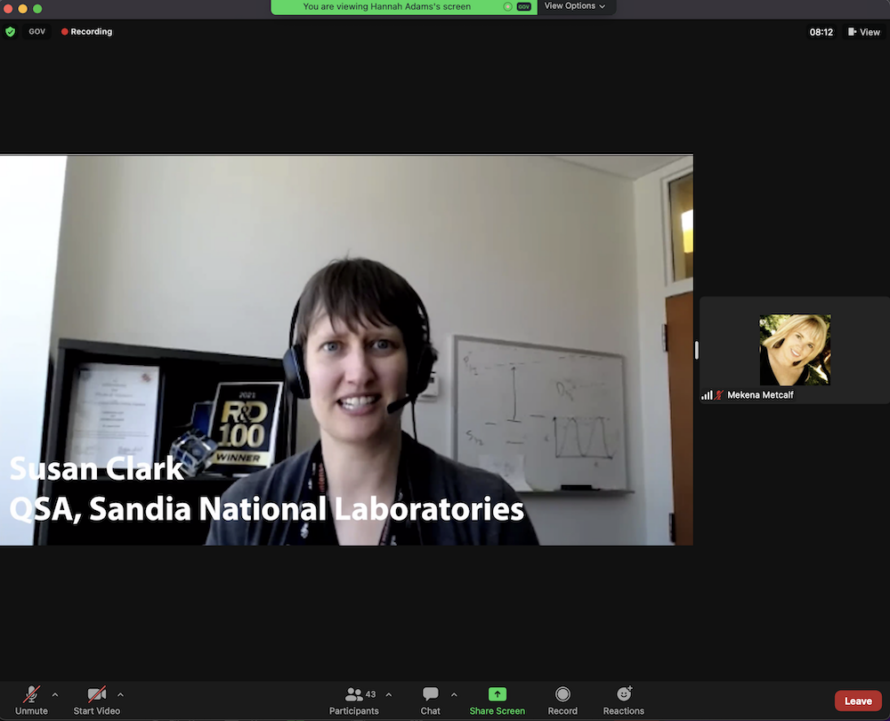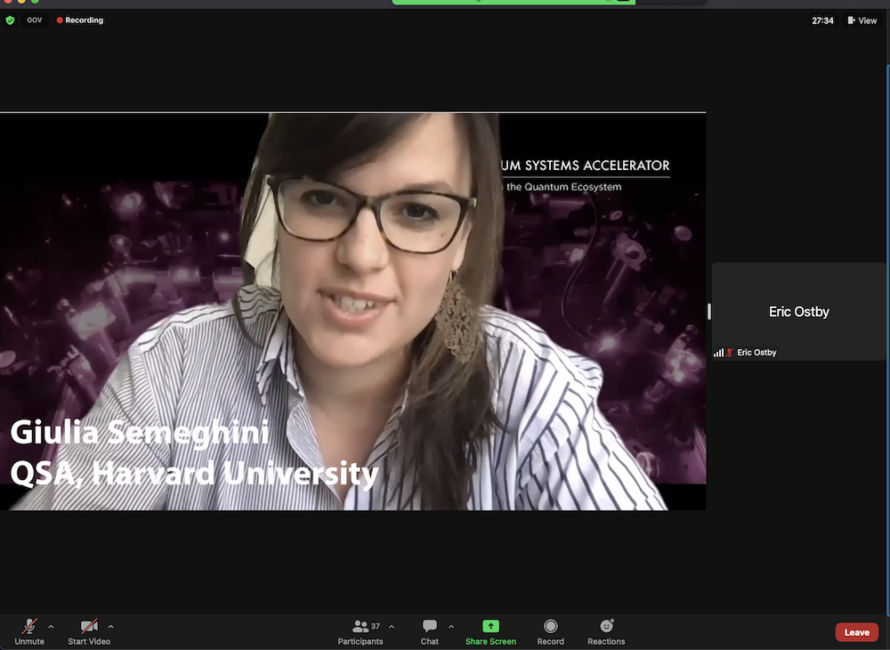QSA worked with the four other DOE Centers to make the fundamentals of quantum information science (QIS) and technology accessible and highlight ongoing national research and development efforts. Each Center is led by a national laboratory and, coupled with DOE’s core research portfolio, stewards the ecosystem needed to foster and facilitate the advancement of QIS, with a major anticipated national impact on national security, economic competitiveness, and U.S. continued leadership in science.
DOE Under Secretary for Science and Innovation Geraldine Richmond opened the briefing with a special address about the importance of advancing QIS.
A diverse group of scientists affiliated with the five National QIS Research Centers hailing from national labs, academia, and industry, including Microsoft and Rigetti Computing, presented on a variety of topics, including:
- What is QIS?
- What’s the difference between QIS and other advanced science pursuits?
- What is the potential of QIS?
- Why is U.S. leadership in QIS important?
- What are the biggest challenges in realizing these technologies?
- What is the U.S. government doing to address these challenges?
Mekena Metcalf, a former research scientist at Lawrence Berkeley National Laboratory (Berkeley Lab), affiliated with QSA, and currently in industry, tackled the second topic: “What’s the difference between QIS and other advanced science pursuits?”
The event included pre-recorded video interviews from scientists across the Centers, giving attendees a taste of the breadth and depth of experience in the QIS ecosystem. QSA was also represented by Susan Clark, scientist at Sandia National Laboratories, and Giulia Semeghini, postdoctoral researcher at Harvard University.



Attendees had the opportunity to ask some of their most burning questions about the near-term applications of quantum technologies and how quantum computers can outperform classical computers for specific problems.
Watch the playlist of the briefing on Youtube,
All DOE National QIS Research Centers incorporate a collaborative research team spanning multiple scientific and engineering disciplines and institutions. In addition, each Center seamlessly integrates the science and technology innovation chain to accelerate progress in QIS research and development, facilitate technology transfer, and build the future quantum workforce. To learn more, visit, https://science.osti.gov/Initiatives/QIS/QIS-Centers
Founded in 1931 on the belief that the biggest scientific challenges are best addressed by teams, Lawrence Berkeley National Laboratory and its scientists have been recognized with 14 Nobel Prizes. Today, Berkeley Lab researchers develop sustainable energy and environmental solutions, create useful new materials, advance the frontiers of computing, and probe the mysteries of life, matter, and the universe. Scientists from around the world rely on the Lab’s facilities for their own discovery science. Berkeley Lab is a multiprogram national laboratory, managed by the University of California for the U.S. Department of Energy’s Office of Science.
DOE’s Office of Science is the single largest supporter of basic research in the physical sciences in the United States, and is working to address some of the most pressing challenges of our time. For more information, please visit energy.gov/science.
Sandia National Laboratories is a multimission laboratory operated by National Technology and Engineering Solutions of Sandia LLC, a wholly owned subsidiary of Honeywell International Inc., for the U.S. Department of Energy’s National Nuclear Security Administration. Sandia Labs has major research and development responsibilities in nuclear deterrence, global security, defense, energy technologies and economic competitiveness, with main facilities in Albuquerque, New Mexico, and Livermore, California.
The Quantum Systems Accelerator (QSA) is one of the five National Quantum Information Science Research Centers funded by the U.S. Department of Energy Office of Science. Led by Lawrence Berkeley National Laboratory (Berkeley Lab) and with Sandia National Laboratories as lead partner, QSA will catalyze national leadership in quantum information science to co-design the algorithms, quantum devices, and engineering solutions needed to deliver certified quantum advantage in scientific applications. QSA brings together dozens of scientists who are pioneers of many of today’s unique quantum engineering and fabrication capabilities. In addition to industry and academic partners across the world, 15 U.S. institutions are part of QSA: Lawrence Berkeley National Laboratory, Sandia National Laboratories, University of Colorado at Boulder, MIT Lincoln Laboratory, Caltech, Duke University, Harvard University, Massachusetts Institute of Technology, Tufts University, UC Berkeley, University of Maryland, University of New Mexico, University of Southern California, UT Austin, and Canada’s Université de Sherbrooke. For more information, please visit: archive.quantumsystemsaccelerator.org.
